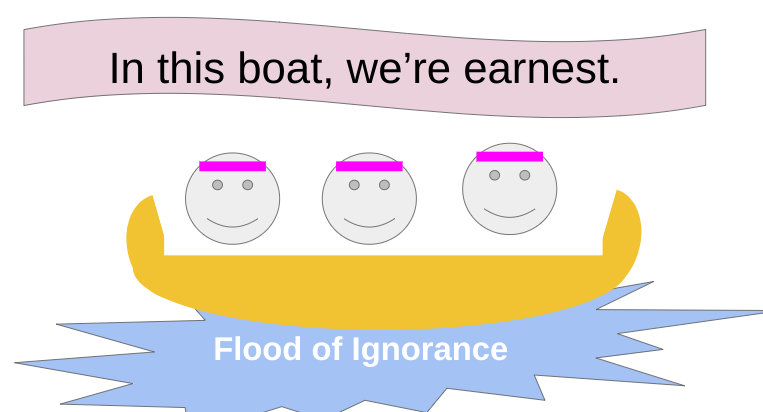Coughing. Gasping. Thrashing through rapids. With unexpected waves drudging rocks, sludge, and debry down upon a once placid lake, a well-prepared swimmer would panic. Nose plugs, goggles, and a swim cap do nothing to prevent the swirling catastrophe closing in.
The flash flood invading our routine, is the sudden wave of proud ignorance crashing into the world today. Education has long-been the tool to banish ignorance. But, how can we combat ignorance if students think of it as a blessing?
Boastful ignorance is an insidious and poisonous notion that has crashed up modern society. Perhaps you haven’t seen it or think that phrase is a paradox. However, it is not as uncommon as you may think. Let me tell you some ways it is cropping up.
Have you ever heard students call each other try-hards? It is a phrase meant to mock students who care about school. The intended effect is to shame people away from learning, participating, and growing. I believe, on some level, the intent is really that students don’t want to get too far behind their peers who are doing well and excelling. Instead of learning more themselves, they just want to stall the excelling student.
There are 1.6 BILLION views on TikTok on the trend: “#IDKnever”–This label indicates“I don’t know, never read the book.” It is teenagers and twenty-somethings celebrating each other for not reading books typically assigned in high school. They make jokes like cooking brownies at 451 degrees, and someone “finally” catching a bag of rye bread; I won’t explain the rest (I actually couldn’t). However, you should know the Bradbury Brownie bit netted that kid 65,000 “likes.”
Scrolling through social media in 2020, you will see countless people boasting about how easy it is to cheat in their new digital platform. Memes, videos, and other post glorify people showing bits pretending to buffer or freeze during presentations.
Ignorance is dangerous in the world, but it is especially threatening in adolescence. The human brain is actually physically developing until about the age of 25. The brain will close synapses not in use. A lazy, willingly ignorant teenager is of the utmost concern–they will become adults unable to reason. Once older, the ability to be logical, empathetic, and productive will be limited by how much they tried to be those things when they were younger.
I am not an expert, nor can I provide a panacea. However, observing other excellent teachers around me, I believe the antidote to this attitude is pure enthusiasm and an earnest approach.
I embarrass myself daily by getting excited about grammar, novels, or vocabulary. Passion bubbles out of my classroom. I celebrate every victory, and hang my teens’ artwork up around the room. The students know I’m a nerd; moreover, they know I don’t care if they call me one.
My unit introductions are my personal time to shine. My nerd comes pouring out. These days are like my performance at The Improv–and I am performing for the people in the back row. My ninth graders endure my voice undulations while I dash through the desks reciting Shel Silverstein on poetry intro day; they get tricked into thinking Shakespeare wrote “Party in The USA” during a pop-sonnet performance. For my Antigone introduction, I’ve created a truly absurd hand-drawn stick figure re-telling of the backstory of Thebes. There are dramatic pauses, and multiple character voices. The absurdity is often met with applause. Whether the applause is sarcastic or sincere, it makes no difference to me. They heard my points.
At the beginning of the year, students roll their eyes and cross their arms. Slowly but surely, people let their guard down and learn. At the least, they back away from mocking others. I repel their cynicism with impenetrable enthusiasm.
I’m certain students make fun of me outside of school, but their negativity does not invade my classroom. Students who want to learn are protected by my over-the-top passion.
I know I can’t single-handedly stop the flood of boastful ignorance drowning our population, but I can throw out a few life jackets to people, pick ‘em up in a lifeboat, and ride the flood out together.
And maybe, just maybe, I can get a few more teachers to do the same.
What is your most-over-the-top thing you do in your room? How do you combat ignorance in your classroom? Leave a comment below!










Comments 2
Great read! This reminds me of why Teacher Credibility is so high on Hattie’s list of practices that impact student achievement. Hattie says 4 things are needed for teacher credibility: trust, competence, dynamism, and immediacy. You’ve got them all!
Thanks for this read! It is refreshing. I teach grades 1-3 in a public Montessori. We build the expectation that we have an academic environment. Students that choose to not work or not be their best academically find themselves alone pretty quick in our class because there peers tend to leave them to themselves. The eventually get tired of their peers asking them “What they you working on?” Thirds get embarrassed pretty quick when a 1st or 2nd show them up in quality and enthusiasm for learning. Eventually, a few peers will honestly, genuinely, and lovingly ask “why do you come to school if you don’t plan on learning anything?” Thankfully, because of the environment and approach of Montessori, instruction is individualized so barriers to learning are not an issue. After a bit, reaching for knowledge is embraced.